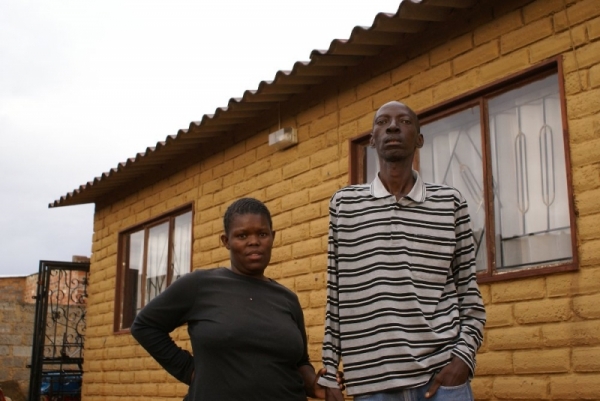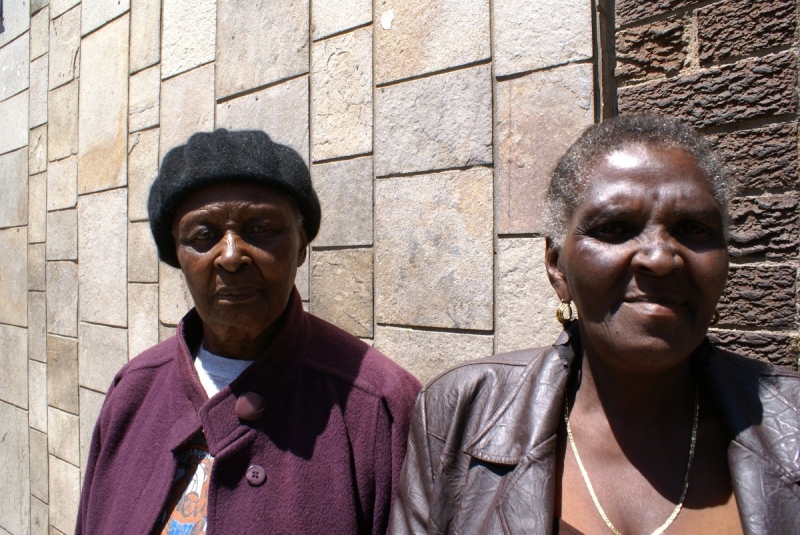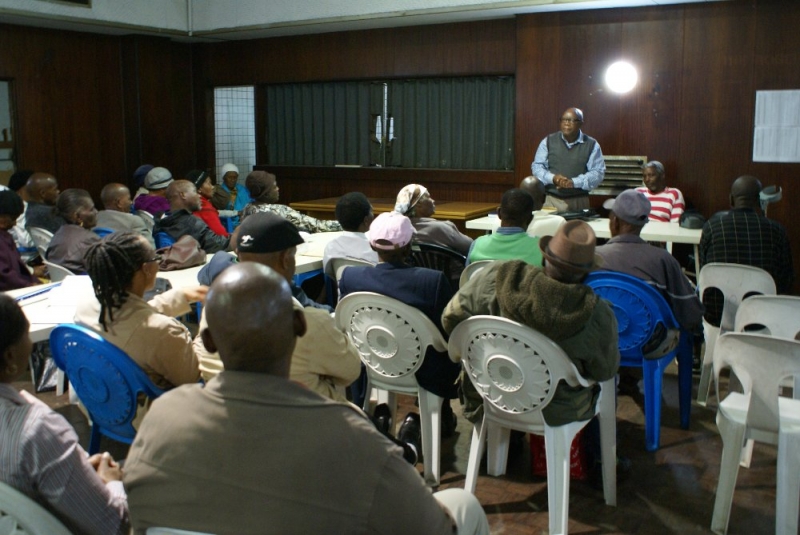Residents fight back against banks’ eviction tactics

A group called Lungelo Lethu Human Rights Foundation is preparing a class action suit against the four major banks for what it says are the unlawful evictions of thousands of South Africans from their homes.
The group is being led by King Sibiya, who has waged this fight before. “What we are seeing now is no different from the human rights violations that we fought against during the apartheid years. The difference now is we are fighting the banks. And it is not just black people who are victims of the banks, white people are too. This case shows that justice is for the haves, not for the have-nots.”
The Constitution provides protection against arbitrary deprivation of property, but Sibiya says this is routinely flouted by the banks.
Most of the evictees represented by the Foundation are from poor communities in Gauteng. In many cases, they were evicted from properties they had occupied for decades, properties that were acquired during the apartheid years when blacks were denied freehold title. The best they could get was a 30 or 99 year lease from the local municipality, which was the primary landowner in places like Soweto. Banks started lending money to those with leasehold title, and this is where trouble seems to have started. Part of the claim the Foundation is making against the banks is that they were not entitled to loan money to those with leasehold title, since in the event of default the property would revert back to the local authority - effectively nullifying their collateral (being the house). This is part of the legal mess the court is going to have to sift through.
At a meeting of about 40 evictees in Johannesburg’s Central Methodist Church last month, some disturbing stories of abuse were told, such as that of 91-year old Gladys Mviko, who was evicted from her home in Vosloorus in 2012 for reasons she cannot fathom.
Mviko acquired her home in 1988 by way of a 99 year lease, and took out a small loan with the Perm (later acquired by Nedbank) to build an extra few rooms. On 24 November 1998 a judgment was allegedly handed down against her for default on her loan with the bank. This is an impossibility she says, as she was up to date with her payments to the bank. The property was sold at auction on 17 May 2012 for R100 – a ridiculous and suspiciously low price. Mviko says no summons was served on her, and on the basis of this alleged judgment she was evicted from her property – without a court order.
“Who gave the bank permission to sell my house?” she asks. Her loan to the bank was debited every month from her pay cheque, and was not in arrears, she maintains.
She now lives with her daughter, Florence Majola.
Sibiya points over to the Johannesburg High Court building, a half block away from where we are sitting. “Go and look at the court roll in the High Court any day of the week. 80% of the cases in the court are home repossessions and Road Accident Fund cases. And nearly a third of the 80% are default judgments.”
I went over and checked the court roll as he suggested and he was right. By far the majority of cases on this particular day involved the banks against presumably defaulting clients.
Sibiya fought for tenants’ rights in the apartheid years, and was one of the architects of the Mngomezulu versus City Council of Soweto case in 1986 that prevented tenants being evicted from their homes for non-payment of rent on the grounds that the City Council had not followed the law in setting rentals. The case was won on technical rather than human rights points, but it gave black residents greater security of tenure in their homes. While whites enjoyed freehold title over land under apartheid, blacks were regarded as transients who had to make do with leasehold rights.
 Gladys Mviko and her daughter Florence Majola. Mviko had to move into Majola’s house after, she says, her home was auctioned by the bank for R100. Photo by Ciaran Ryan.
Gladys Mviko and her daughter Florence Majola. Mviko had to move into Majola’s house after, she says, her home was auctioned by the bank for R100. Photo by Ciaran Ryan.
The stories of eviction range from the tragic to the bizarre. Moses Mgijima (65) now lives in a shack in Thembisa, having been evicted from a municipal house he had acquired under leasehold title in 1982. He says he never borrowed a cent from Nedbank, but was evicted in 2012 when he was informed that his house had been sold by Nedbank to a company going by the name CC Trade 57 cc. He brandishes a letter from Nedbank saying a loan was taken out, but Mgijima says they have the wrong person. “I never had a loan with Nedbank. They show my property in the name of Maria Mbatha (who lives in Thembisa at a similar numbered but different address).”
Josephine Ncanywa also lived in a leasehold property in Dobsonville Ext 2. She borrowed R28,700 from the bank and admits to falling behind on her payments, but I was shown an insurance policy issued by the Perm that it would cover any shortfall payments - which apparently never happened. She says no summons was served on her (a common complaint) and she was evicted in 2005. She complained to the local municipality and was told to re-occupy the house, which she did. She claims she was then evicted a second time in 2008 by Red Stripe Trading 68 cc without a court order – which is illegal. She went to retrieve her court file but it was lost. She now lives in Orange Farm.
Communities are wising up to the home repossession scandal and now come out in force whenever the sheriff arrives with officials to evict tenants. The same tactic is being used in other parts of the world and lawmakers are getting the message. Greece has changed its law to prevent homeowners being evicted from their primary residence.
At the Central Methodist Church in Johannesburg I meet up with Solomon Nhlapo, whose late mother Mary acquired a 99 year lease house in 1965 and in the 1980s borrowed money from the Perm to build extensions. Mary passed away in 1994 but her son Solomon continued paying the bond until 1997 when he figured he had probably paid off the loan amount. He approached the bank and asked for the outstanding balance, only to be told he could not have that information as the account was in his mother’s name. “But my mother is dead and I am the one paying the bond,” he told the counter clerk. He told the bank he must assume the bond was now fully paid up and therefore stopped paying. He then discovered that the house had been sold to a company CUF Properties for R100 at auction. No summons was issued, no eviction order was presented, according to Nhlapo.
CUF has since sold the house to a new owner for R350,000. Nhlapo shows me a letter from the bank showing the bond was paid up and instructing Nedbank’s home loans department to hand over the title deed. Instead, the bank sold the property to CUF.
 Meeting on evictions at Johannesburg’s Central Methodist Church in November. Photo by Ciaran Ryan.
Meeting on evictions at Johannesburg’s Central Methodist Church in November. Photo by Ciaran Ryan.
When I previously investigated a slew of similar complaints in Cosmo City, to the north of Johannesburg, the pattern was the same. No summonses, no eviction orders. All of the evictees were working people, some of whom had lost their jobs and run into cash flow difficulties, with little or no knowledge of the law. It is easy to bamboozle them with official-looking eviction notices. One Cosmo City resident, Victor Zuma, had his home repossessed by FNB over an arrears amount of R6,000. He is now seriously ill, the result he says of the stress of first losing his job, then his house. When contacted for comment, FNB says it tries to give defaulting customers time to catch up on arrears and only engages in the sale in execution process as a last resort – a stock answer whenever this type of question is raised. I asked the same question of the other banks and got pretty much the same answer.
“What they do is the sheriff arrives and if no-one is around he hands the summons to a neighbour,” says Maxwell Dube, publisher of the Cosmo City Chronicle, which has investigated corruption around home repossessions in the area. “Most of the people I have spoken to who have been affected by this did not see their summons before they were evicted.”
One investor had purchased 26 properties in Cosmo City in 18 months, all of them repossessed by Absa. When I tried to contact the investor, he would not take my calls. Later I discovered that he had started transferring the properties out of his name, presumably to cover his tracks.
Another sad case is that of Johannah Tshabalala who, with her late husband Mantae Petrus, acquired a house in Katlehong’s Khumalo section for R39,000, financed by Nedbank. This was fully paid in February 2007. In fact Tshabalala over-paid an extra R1,000. She tried to approach the estate agent who sold her the property for her title deed, but he had since disappeared. In 2010 she received a summons saying the owner of her fully-paid up house is CUF Properties and she had 30 days to vacate. A deed search shows CUF bought the house in 2009 for R69,000. The deeds register shows the house has been sold seven times since. She was evicted in April 2015, but remains a squatter in her own house. She was arrested for trespassing and granted R300 bail - all for a house that she insists is fully paid up.
Though Nedbank features prominently in the cases mentioned above, it is by no means the only bank accused of improper or unlawful behaviour.
When presented with the above information, Nedbank appeared keen to resolve the matter.
Nedbank’s press spokesperson Esme Arendse wrote: “Given the significant time lapse that has occurred since the events relating to the specific clients, it has been difficult for us to gather all the information we need on each matter. We will, however, do our best to help each client.
“You will appreciate that we have a confidentiality obligation to our clients and as such we need to liaise directly with each of them. It would help tremendously if you would please provide us with the current contact details for each client so that we may further look into their circumstances and communicate directly with them.
“We assure you that we take the issues that you have raised very seriously and will do whatever we can to resolve these issues for our clients.”
A final case worthy of mention is that of George Ncholo, who in 1987 put down a R1,000 deposit for a stand in Tokoza, Alberton. He then engaged the services of the Family Housing Association, a self-help scheme set up to assist people in poor communities to build their own houses. Bit by bit he pieced together the R18,200 needed to build his house – all of it out of his own pocket. By his version of events, in 2009 out of nowhere Absa bank suddenly appeared as the owner of his property.
“But I never had a mortgage loan with Absa,” he insists. “I don’t know how this happened, but they now want to evict me.”
He produced an Absa bank statement showing a debit balance of some R16,000 dating back to the early 2000s, which also reflects the fact that he was servicing this loan each month. But this was not a mortgage loan. Ncholo then shows me a letter from Simon Kekana at Absa’s Braamfontein branch showing that his account with the bank is paid in full. The new owner, who purchased the house for R180,000, has brought the action to evict Ncholo.
One name that repeatedly appears as the owner of many of these properties is CUF Properties. Other names of companies that have acquired properties and then evicted the tenants are CC Trade 57, Pyraned Ltd, Get-A-Home cc and Red Stripe. King Sibiya says these companies and their directors will be cited as respondents in the class action suit the group is planning to bring to court early in the new year.
Research by Advocate Douglas Shaw, who is representing the Foundation, suggests that about 10,000 homes a year were being repossessed by the banks, often without following due process. As part of a PhD thesis, Shaw compared South Africa’s home repossession practices with those of other countries and concluded that we were among the most abusive in the world. While most countries afford defaulting borrowers time to catch up on their repayments and explicitly outlaw the sale in execution of houses at prices which are out of line with market values, such practices in SA are routine. “SA is in the stone age when it comes to home repossessions,” says Shaw.
The matter is getting some political attention. According to African News Agency, Minister of Higher Education Blade Nzimande told attendees at the launch of the South African Communist Party (SACP) Red October campaign recently: “This level of eviction can only be comparable to apartheid-era group areas removals. The homes are then sold at auction, very often at a fraction of their market value. The worst case scenario involved a house sold at R10, and a house taken away for nothing but corruption involving the concoction of title deeds; the owner was dispossessed and jailed for a while. All this is inhuman.” The SACP intends to ask Chief Justice Mogoeng Mogoeng to institute an investigation into the whole process of authorisation of house repossessions.
“Having lived through the apartheid years and having successfully fought the National Party government to secure tenancy rights for blacks, now we find ourselves fighting the very same battle with the banks,” says Sibiya. “If you steal a cell phone you go to prison. You steal a house, you become a respected member of the community.”
The four major banks were asked to respond to a draft version of this article. Nedbank’s response is recorded in the main text.
FNB stated that its Home Loans division does not currently have any financed leasehold properties on its book. “We have no additions to FNB’s statement used in the current article.”
Standard Bank responded, “Unfortunately we are not in a position to respond in general to specific references you have made about other banks.”
No response was received from Absa.
Next: Masiphumelele to get its own fire station
Previous: National Minimum Wage: Cosatu calls for R4,125 to R5,276 a month

This article is licensed under a Creative Commons Attribution-NoDerivatives 4.0 International License.


